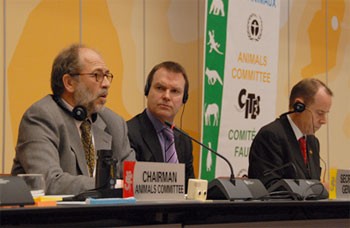Sharks Dominate CITES Agenda Once Again

Sharks, and other aquatic species, dominated the 5-day meeting of the Animals Committee of the Convention on International Trade in Endangered Species of Wild Fauna and Flora (CITES) which ended last week in Geneva. I was there representing Project AWARE as an accredited observer NGO. And it was another great opportunity to voice our collective support for shark conservation and to connect with representatives of CITES Parties and NGOs on shark issues.
The CITES listing of over 4,500 animal species includes only three species of sharks to date –whale, great white and basking. Yet international trade in sharks is one of the key drivers of overexploitation. The Animals Committee provides technical and scientific advice to CITES member countries and helps ensure that international trade in CITES-listed species is sustainable.
Mr. Carlos Ibero, Chair of the Animals Committee, stated, “I am glad to see that the Committee was able to focus on key aquatic species such as sharks, dolphins and corals in preparation for the upcoming meeting of the Conference of the Parties to be held in Bangkok in March 2013.”
Shark related highlights from the meeting include Germany’s draft proposal to include porbeagle (Lamna nasus) in CITES Appendix II and a review of country reports on their shark management and conservation policies in place.
As a member of the shark working group, I participated in the group’s discussions of 11 country reports focusing on: trade in shark species progress and the implementation of national or regional action plans, shark measures regulating fishing, retention or landing of shark or ray species measures and the regulation of import or exports of shark parts and products (fins, meat, skin, organs, etc).
The working group has formulated an extensive list of recommendations for consideration by the Committee. These include a request for reports from other of the 26 top shark fishing nations who have not yet reported on their shark management activities and an emphasis on the need for species specific data collection and reporting.



